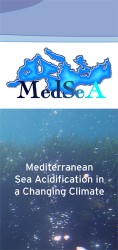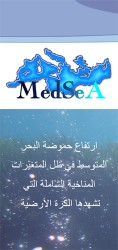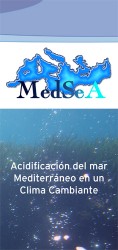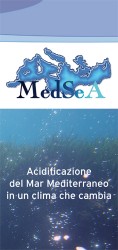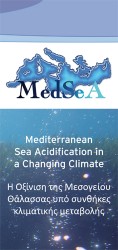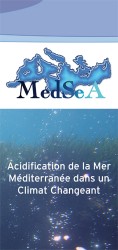About MedSeA
MedSeA – Mediterranean Sea Acidification in a changing climate
The MedSeA is a Framework Program 7 (FP7) project that will run for 3.5 years from 2011.
- 16 partners and 6 associated partners
(with 3 from International Cooperation Partner Countries (ICPCs) & 1 associated country) - 86 PIs
- It includes 12 nations with 18 institutes from the Mediterranean region.
- The total project budget is about € 6 M (excluding ship time)
- It is co-financed by the European Community for € 3.5 M.
Increases of atmospheric CO2 and associated decreases in seawater pH and carbonate ion concentration this century and beyond are likely to have wide impacts on marine ecosystems including those of the Mediterranean Sea. Consequences of this process, ocean acidification, threaten the health of the Mediterranean, adding to other anthropogenic pressures, including those from climate change. Yet in comparison to other areas of the world ocean, there has been no concerted effort to study Mediterranean acidification, which is fundamental to the social and economic conditions of more than 130 million people living along its coastlines and another 175 million who visit the region each year.
The MedSeA project addresses ecologic and economic impacts from the combined influences of anthropogenic acidification and warming, while accounting for the unique characteristics of this key region. MedSeA will forecast chemical, climatic, ecological-biological, and socio-economical changes of the Mediterranean driven by increases in CO2 and other greenhouse gases, while focusing on the combined impacts of acidification and warmingon marine shell and skeletal building, productivity, and food webs. We will use an interdisciplinary approach involving biologists, earth scientists, and economists, through observations, experiments, and modelling.
These experts will provide science-based projections of Mediterranean acidification under the influence of climate change as well as associated economic impacts. Projections will be based on new observations of chemical conditions as well as new observational and experimental data on the responses of key organisms and ecosystems to acidification, which will be fed into existing ocean models that have been improved to account for the Mediterranean ‘s fine-scale features. These scientific advances will allow us to provide the best advice to policymakers who must develop regional strategies for adaptation and mitigation.
MedSeA project objectives
- identify where the impacts of acidification on Mediterranean waters will be more significant, taking into account the sequence of causes and effects, from ocean chemistry through marine biology to socio- economic costs.
- generate new observational and experimental data on Mediterranean organism and ecosystem responses to acidification and fed into existing fine-scale models of the Mediterranean Sea that are modified to better represent key processes, and then used to project future changes. The MedSeA focuses on a selected set of key ecosystem and socio-economic variables that are likely to be affected by both acidification and warming, studying the combination of both effects through ship-based observations, laboratory and mesocosm experiments, physical-biogeochemical-ecosystem modeling, and economical analyses.
- provide best estimates and related uncertainties of future changes in Mediterranean Sea pH, CaCO3 saturation states, and other biogeochemical-ecosystem variables, assessing the changes in habitat suitability of relevant ecological and economically-important species.
MedSeA leaflets
Available in English, Spanish, French, Arabic, Italian and Greek.


